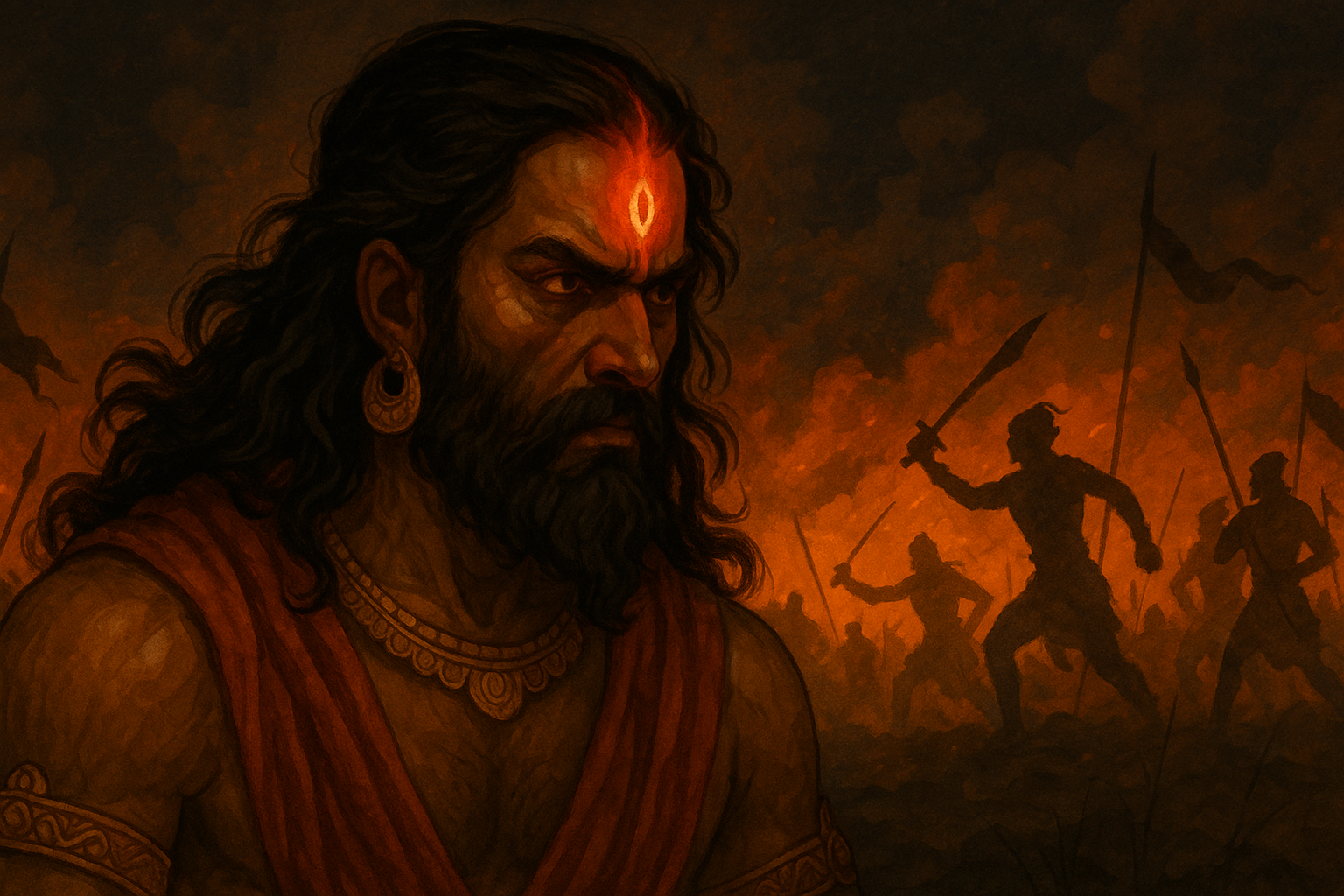When the dust settled on Kurukshetra, silence fell in a way the world had never heard before. The clashing of chariots had stopped, the battlefield had emptied, and the cries that once pierced the sky were now woven into memory. Victors and survivors returned to their camps, but one story refused to walk away from the ashes. It belonged to a man who didn’t die at the end of the war. He lived on—because fate demanded he must.
His name was Ashwatthama.
He was the son of Dronacharya, the revered teacher who had trained warriors on both sides of the war. Born into a Brahmin lineage but shaped like a Kshatriya, Ashwatthama embodied strength, discipline, and a certain fire in his eyes. At birth, he was blessed with a divine gem embedded in his forehead—a celestial stone said to protect him from hunger, thirst, disease, fear, and weapons. With this jewel, he was destined to be unstoppable.
But destiny isn’t impressed by birth. It waits for choices.
When Dronacharya fell in battle, it was not the weapon that killed him—it was belief. He was deceived into accepting that Ashwatthama, his son, had died. In that belief, he let go of his weapons and accepted death, his heart broken more deeply than any arrow could pierce. When Ashwatthama learned how his father was undone, a storm rose within him—quiet at first, then hungry.
The war had already ended. The Kauravas lay defeated. Yet grief rarely listens to logic. On a night meant for sighs of relief, Ashwatthama chose vengeance. He infiltrated the Pandava camp, determined to avenge his father by killing the five brothers. But vengeance is blind, and shadows betray. In their place slept five boys—the sons of Draupadi. He struck swiftly, not knowing they were not his intended targets.
Morning rose to a mother’s cry—raw, unfiltered, ancient. Draupadi’s sorrow did what battle could not. Her grief soaked the earth, and even Krishna listened.
Ashwatthama was found soon after, cornered and alone. In him, one could see the outline of a man who regretted too late. Pandava anger called for blood, but Draupadi, even in mourning, chose restraint. She refused to commit the sin that had consumed him—killing a Brahmin’s son. Krishna agreed; the punishment had to be deeper than death, heavier than blood.
They removed the divine gem from Ashwatthama’s forehead. With that act, his invincibility faded. His body would now suffer hunger, pain, disease, and decay. Krishna decreed that he would walk the earth until the end of the current age—Kali Yuga—never fully healed, never fully dying. It was a sentence to carry his mistake, to feel regret settle in the bones, to hear silence louder than screams.
Time moved on. Kingdoms rose and fell. Myth turned into folklore. Yet somewhere in the vastness of forests and forgotten temples, whispers continued. Travelers spoke of a wandering figure—scarred, exhausted, and distant. Some claimed his wounds smelled of centuries. Others said he asked for medicinal herbs or salt. None could prove it; all claimed they didn’t imagine it.
Stories persisted because some lessons refuse to fade.
Ashwatthama’s curse wasn’t merely punishment. It was instruction. It shows what happens when anger overrides reason, when revenge replaces dharma, and when pain becomes identity. Death can end suffering. Life can carry it far longer.
Across villages in India, his name still lingers like an echo. There are shrines dedicated to him—not worshipped with idols, but remembered with caution. Devotees believe his presence brings knowledge, but his gaze carries weight. He is a figure both feared and respected—not because he triumphed, but because he was undone by himself.
The Mahabharata never intended to glorify perfection. It held a mirror before humanity, reflecting both our light and shadow. Ashwatthama occupies a unique place in that mirror—he is the man who could not die, because his lesson could not end.
Today, when someone allows anger to write their decisions, when ego shapes action, when grief becomes weapon—the old story quietly returns. Somewhere, in the distance of imagination or memory, a lone figure is said to walk still. Not as a ghost, not as myth, but as a reminder.
Dharma can forgive.
Destiny can punish.
But the one we must fear most… is ourselves.
And so long as that truth remains, Ashwatthama walks.
